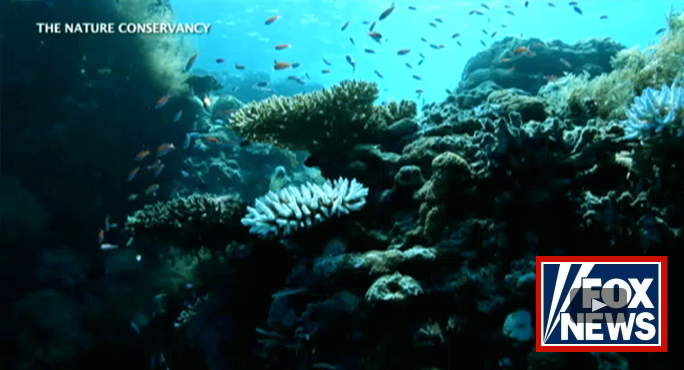Click image above to watch ‘The Importance of Drugs From the Sea’ on Fox News
According to surveys of coral reefs, these living aquatic ecosystems are imperiled worldwide, due to a variety of human factors, including climate change and increasing water temperatures.
Pollution, careless fishing, ozone depletion and reckless diving practices also contribute to reef decline. Changes in the environments of the oceans means changes in living conditions for reefs, which are bleaching and becoming diseased at rapid rates.
Ongoing studies conducted both by the International Union For Conservation of Nature and the U.S. National Oceanographic and Atmospheric Administration confirm a correlation between higher levels of atmospheric carbon dioxide, or so-called greenhouse gas, and declining reefs around the world. And while the U.S. government has placed a mere two species of coral on the endangered species list, as many as 250 species appear to be in trouble.
Besides being critically important to fish and a plethora of marine life, coral reefs are also sources of life-saving drugs. And while previous thought has pointed to the rainforests of the world for cancer remedies and possible effective treatments for AIDS, thus far coral reefs appear to be even richer sources of compounds for such purposes.
Consider the anti-cancer Caribbean sponge Cryptotethya crypta. Drugs already based upon compounds in this sponge include the AIDS drug AZT, an anti-viral drug called ara-A, and the anti-leukemia drug ara-C.
The algae-eating Indian Sea Hare Dolabella auricularia, is the source of dolastatin, the basis for the drug Auristatin. Studies of this drug show benefits for the treatment of non-small cell lung cancer, ovarian cancer, and myeloid leukemia. The compound dolastatin appears to come originally from a type of bacteria consumed by the sea hare.
Another drug, Bryostatin, derives from the spongy Bugula neritina. In studies conducted so far, bryostatin shows promised in the treatment of lung cancer, non-Hodgkin’s Lymphoma, and chronic lymphocytic leukemia. Bryostatin is also currently undergoing clinical trials for the treatment of Alzheimer’s disease. Tests conducted by the Blanchette Rockefeller Neurosciences Institute show that Bryostatin can protect against memory loss, reduce the Alzheimer’s disease protein A Beta, and restore lost synapses. and protect against the loss of memory functions. Bryostatin also enhances and restores memory by rewiring previously damaged connections in the brain.
The green algae Alga Bryopsis contains Vibrio bacterium that produces kahalalide F (KF), a novel anti-tumor agent that demonstrates potent destroying activity activity against human prostate and breast cancer cells. If tests of this compound continue to demonstrate efficacy, we may have another potent weapon against two very common forms of cancer.
The approved anti-tumor drug Yondelis comes from the sea squirt Ecteinascidia turbinata , (source of an opaque Tunicate. Yondelis interferes with the DNA of tumor cells, and disrupts many of the life processes needed by these cells to replicate. Today Yondelis is approve for the treatment of for prostate, breast and pediatric cancers.
The seas of the world not only supply an abundance of protein sources including fish and crustaceans, but they also supply profoundly beneficial compounds including omega-3 fatty acids and life-saving drugs. But poor environmental practices including excessive carbon emissions are straining the capacity of the world’s oceans to function in a healthy manner. Sadly, even today in the 21st century, some people do not comprehend the impact that humans can and do have on the natural environment. Yet tens of thousands of scientists around the world agree that carbon emissions arising from fossil fuels, and the large-scale production of livestock, are exerting a devastating effect on the natural environment. One of these effects is the steady destruction of coral reefs worldwide.
Environmental preservation can seem to some a cerebral or ephemeral thing until you or a loved one face a shortage of a life-saving drug that is in decline as a result of reckless practices. The oceans of the world are host to bio-diverse reefs, and these reefs appear to be the most abundant sources of anti-cancer drugs. Will we develop drugs in adequate supply that can save millions of lives? Or will our medical future dim due to heedless destruction of nature?


